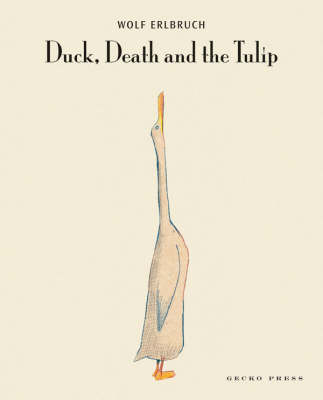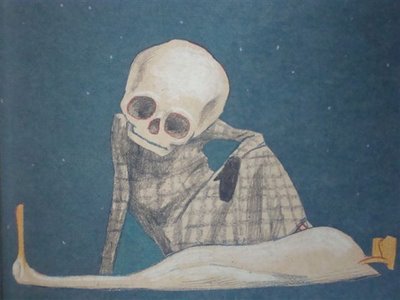2018 School Spending Survey Report

Find more great Horn Book content at these links:
Recommended books: reviews and themed booklists
App and e-book reviews
Movie reviews
Event news and recaps
Events calendar
Komm, süßer Tod
Picture books about death typically involve wrinkly grandmas or unfortunate pets, rehashed platitudes and sensitive toddlers smiling up to the stars.
 Picture books about death typically involve wrinkly grandmas or unfortunate pets, rehashed platitudes and sensitive toddlers smiling up to the stars. Not so in Wolf Erlbruch’s Duck, Death and the Tulip (Gecko Press, September), just published in English for the first time.
Picture books about death typically involve wrinkly grandmas or unfortunate pets, rehashed platitudes and sensitive toddlers smiling up to the stars. Not so in Wolf Erlbruch’s Duck, Death and the Tulip (Gecko Press, September), just published in English for the first time.Wolf Erlbruch has won many awards—including the Hans Christian Andersen Award in 2006—for his picture books in Germany since 1985. Only a few of his books have been translated into English, so many thanks to Gecko Press for introducing American readers to an awesome talent. His books concern life’s mysteries, such as The Big Question, which asks, “Why am I here?” or The Miracle of the Bears, in which a cheeky cub ponders, “How did I get here?”
Duck, Death, and the Tulip continues Erlbruch’s tradition of engaging parents and children in a nap-time philosophy class. The book stars Death, a cute grim reaper with an over-sized skull, and Duck, a friendly fowl “scared stiff” when she first meets her new friend. “Good, you finally noticed me,” spunky Death says. They slowly become friends while playing together in the pond and trees, all the while ruminating on life.
One night, after Duck uses her body to warm Death while sleeping, she is surprised to have survived the night. As the months pass, and winter finally comes, it is Duck who asks Death, “Will you warm me a little?”

With sparse illustrations (lithographic print and colored pencil collage), the book is beautifully macabre. The characters have a tender relationship, and Duck’s surprised reactions to Death’s blunt sense of humor are a pleasure. Some readers may be creeped out by the subject matter; others may appreciate the story’s honesty and frankness. Erlbruch offers no speculation about an afterlife: when Duck asks if the dead sit on a cloud or roast deep in the earth, Death only states, “You ducks come up with some amazing stories.” Erlbruch tells the reader that, while death may be frightening, it isn’t inherently evil or wrong. As Death lays a tulip on Duck’s body and watches her drift away on the great river, he is “almost a little moved. ‘But that’s life,’ thought Death.”
RELATED
RECOMMENDED
ALREADY A SUBSCRIBER? LOG IN
We are currently offering this content for free. Sign up now to activate your personal profile, where you can save articles for future viewing.






Add Comment :-
Be the first reader to comment.
Comment Policy:
Comment should not be empty !!!